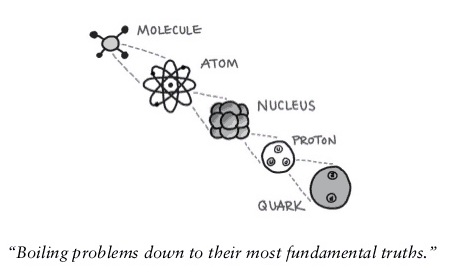Introduction
In the realm of decision-making, the First Principles mental model serves as a powerful tool for effective and rational reasoning. Rooted in human psychology, this model encourages individuals to break down complex problems into fundamental truths and build logical solutions from scratch. By understanding and applying First Principles thinking, we can overcome biases, challenge assumptions, and make decisions that align with our best interests. In this blog post, we will explore the concept of First Principles, examine its prevalence in various contexts, delve into the cognitive biases associated with it, provide practical strategies for avoiding this mental trap, and emphasize the value of active awareness in decision-making.
Defining First Principles and Its Relevance
First Principles thinking involves deconstructing a problem or situation into its most fundamental elements, starting from basic facts or truths that are self-evident. It enables individuals to bypass conventional wisdom and pre-existing beliefs, allowing for original and innovative solutions. By relying on logical reasoning and a deep understanding of the underlying principles, First Principles thinking provides a solid foundation for decision-making.
The prevalence of First Principles thinking can be observed in our daily lives across diverse domains, including personal life decisions, business scenarios, and public policy-making. Let’s explore three examples to illustrate its application:
- Personal Life Decisions: Imagine someone contemplating a career change. Rather than accepting societal norms or common career paths, applying First Principles thinking would involve identifying their core skills, interests, and values. By questioning conventional assumptions and reevaluating their options based on fundamental principles, they can pursue a career path that aligns with their true passions and aspirations.
- Business Scenarios: In the business world, Elon Musk is a prime example of someone who embraces First Principles thinking. When developing SpaceX, rather than accepting the high cost of rocket launches as an inherent limitation, Musk deconstructed the problem to its core elements. By identifying the fundamental principles involved, he revolutionized the space industry and significantly reduced the cost of space exploration.
- Public Policy-Making: First Principles thinking is crucial in public policy-making as well. For instance, consider the issue of sustainable energy. Instead of relying solely on existing energy sources, policymakers can analyze the underlying principles and explore innovative solutions based on renewable resources, environmental impact, and long-term sustainability.
Exploring Cognitive Biases and Psychological Underpinnings
While First Principles thinking offers a logical and rational approach to decision-making, several cognitive biases can hinder its application. Confirmation bias, for example, leads individuals to seek information that supports their pre-existing beliefs, inhibiting them from considering alternative perspectives or challenging the status quo. Overconfidence bias can also cloud judgment, causing individuals to overestimate their understanding of a problem and overlook the need for deeper analysis.
The Dunning-Kruger effect, another cognitive bias, can undermine First Principles thinking by causing individuals to overestimate their competence in a specific area. This inflated self-assessment hinders critical thinking and inhibits the exploration of foundational principles.
To further complicate matters, the availability heuristic may cause individuals to rely on easily accessible information or examples, neglecting the importance of fundamental principles. These biases, along with others, highlight the need for self-awareness and a conscious effort to overcome them when applying First Principles thinking.
Strategies to Avoid the First Principles Trap
To avoid succumbing to cognitive biases and harness the power of First Principles thinking, it is essential to employ practical strategies:
- Challenge Assumptions: Question underlying assumptions and widely accepted beliefs. Seek out contradictory evidence and alternative viewpoints to gain a more comprehensive understanding of the problem at hand.
- Seek Fundamental Principles: Identify the core elements and foundational truths relevant to the decision or problem. Break it down into its basic components to unveil the underlying principles that drive the situation.
- Encourage Diverse Perspectives: Engage in collaborative decision-making by involving individuals with diverse backgrounds and expertise. By seeking input from different perspectives, you can challenge your own thinking and ensure a more comprehensive exploration of First Principles.
- Embrace Iterative Thinking: Recognize that decisions and solutions may need refinement over time. Embrace an iterative approach that allows for continuous learning, adaptation, and improvement.
Conclusion
The First Principles mental model empowers individuals to approach decision-making with rationality and originality. By deconstructing complex problems into their fundamental truths, we can unlock innovative solutions that align with our best interests. However, it is crucial to be aware of the cognitive biases that can impede First Principles thinking and actively work to overcome them. By challenging assumptions, seeking fundamental principles, embracing diverse perspectives, and adopting an iterative mindset, we can harness the true potential of First Principles thinking and make more informed and effective decisions. In doing so, we can navigate the complexities of our lives, businesses, and society with clarity and rationality.
